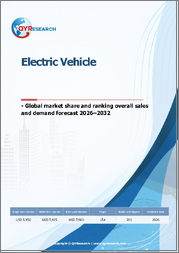
|
시장보고서
상품코드
1781152
전기자동차 시장 : 세계 산업 분석, 규모, 점유율, 성장, 동향, 예측(2025-2032년)Electric Vehicle Market: Global Industry Analysis, Size, Share, Growth, Trends, and Forecast, 2025 - 2032 |
||||||
Persistence Market Research는 최근 세계 전기자동차 시장에 대한 종합적인 분석을 발표했습니다. 이 보고서는 시장 촉진요인, 동향, 기회, 과제 등 주요 시장 역학에 대한 철저한 평가를 통해 전 세계적으로 지속가능한 교통수단으로의 전환이 가속화되고 있는 가운데, 이해관계자들이 정보에 입각한 의사결정을 내릴 수 있도록 돕습니다.
주요 인사이트
- 전기자동차 시장 규모(2025년) : 7,330억 달러
- 시장 규모 예측(금액 기준, 2032년) : 1조 9,020억 달러
- 세계 시장 성장률(2025-2032년 CAGR) : 14.6%
전기자동차 시장 - 분석 범위
전기자동차(EV) 시장은 지속가능하고 에너지 효율적인 운송 솔루션에 대한 수요 증가로 인해 전 세계 자동차 시장의 판도를 바꾸고 있습니다. EV에는 배터리 전기자동차(BEV), 하이브리드 전기자동차(HEV), 플러그인 하이브리드 전기자동차(PHEV), 연료전지 전기자동차(FCEV) 등 다양한 유형의 차량이 포함됩니다. 배터리 기술의 급속한 혁신, 정부의 지원 정책, 소비자의 인식이 높아짐에 따라 세계 전기자동차 시장은 강력한 성장을 이룰 것으로 보입니다. 이 보고서는 차량 유형, 추진력 유형, 항속거리, 지역별로 시장을 분석하여 이해관계자들에게 실용적인 인사이트를 제공합니다.
시장 성장 촉진요인:
전기자동차 시장은 몇 가지 주요 성장 촉진요인에 의해 강력한 모멘텀을 보이고 있습니다. 세제 혜택, 보조금, 엄격한 배기가스 규제와 같은 정부의 노력은 소비자와 제조사 모두 전기자동차를 도입하도록 유도하고 있습니다. 배터리 효율과 충전 인프라의 기술적 진보로 인해 주행거리에 대한 불안감이 크게 줄어들고, 일상적인 사용에서 EV의 실현가능성이 높아지고 있습니다. 또한, 연료 가격의 상승과 청정에너지 차량에 대한 소비자의 선호도 변화는 전기자동차 판매를 더욱 촉진하고 있습니다. 도시화와 스마트 시티의 확대도 전기 모빌리티 솔루션에 유리한 환경을 조성하고 있습니다.
시장 억제요인:
유망한 전망에도 불구하고, 전기자동차 시장은 주목할 만한 도전에 직면해 있습니다. 특히 신흥국에서는 기존 자동차에 비해 높은 초기 비용이 여전히 큰 걸림돌로 작용하고 있습니다. 공공 충전 인프라가 제한적이고 지역에 따라서는 충전 시간이 길다는 점이 대규모 보급의 걸림돌로 작용하고 있습니다. 또한, 배터리 수명, 재활용, 원자재 조달에 대한 우려는 환경 리스크와 공급망 리스크를 야기하고 있습니다. 또한, 전통적 자동차 제조업체의 저항과 정부 정책의 변동은 EV의 성장 궤도에 불확실성을 가져올 수 있습니다.
시장 기회:
전기자동차 시장은 특히 자동차 보급이 빠르게 진행되고 있는 신흥국에서 풍부한 성장 기회를 제공하고 있습니다. 급속 충전 기술, 배터리 기술 혁신, 에너지 저장 솔루션의 발전은 EV의 대량 시장 도입을 위한 새로운 문을 열고 있습니다. 커넥티드 전기자동차 및 자율주행 전기자동차 개발을 위한 자동차 제조사와 하이테크 기업과의 협력 관계도 시장을 발전시키는 원동력이 되고 있습니다. 특히 대중교통과 물류 분야의 차량 전동화는 아직 미개척된 큰 잠재력을 가지고 있습니다. 또한, 그린 모빌리티 스타트업과 청정에너지 프로젝트에 대한 투자자들의 관심이 높아지는 것은 전기자동차 생태계의 밝은 미래를 암시합니다.
본 보고서에서 답변하는 주요 질문
- 세계 전기자동차 시장의 성장을 이끄는 주요 요인은 무엇인가?
- 전기자동차 수요가 가장 높은 지역과 차량 부문은?
- 배터리 및 충전 기술 혁신이 전기자동차 보급에 어떤 영향을 미치고 있는가?
- 전기자동차 시장의 주요 기업들과 그들의 전략적 우선순위는?
- 세계 전기자동차 산업을 형성하는 장기적인 트렌드와 전망은?
목차
제1장 주요 요약
제2장 시장 개요
- 시장 범위와 정의
- 밸류체인 분석
- 거시경제 요인
- 세계의 GDP 전망
- 정부 정책과 인센티브 : 지역별
- 에너지 가격과 연비 : 지역별
- 세계의 자동차 판매 개요
- 예측요인 : 관련성과 영향
- COVID-19의 영향 평가
- PESTLE 분석
- Porter's Five Forces 분석
- 지정학적 긴장 : 시장에 대한 영향
- 규제와 기술 상황
제3장 시장 역학
- 성장 촉진요인
- 성장 억제요인
- 기회
- 동향
제4장 가격 동향 분석(2019-2032년)
- 지역별 가격 분석
- 부문별 가격
- 가격의 영향요인
제5장 세계의 전기자동차 시장 전망
- 주요 하이라이트
- 세계의 전기자동차 시장 전망 : 차종별
- 소개/주요 분석 결과
- 과거 시장 규모 분석 : 차종별(금액·수량 기준, 2019-2024년)
- 현재 시장 규모 분석과 예측 : 차종별(금액·수량 기준, 2025-2032년)
- 스쿠터
- 오토바이
- 승용차
- 소형 상용차
- 대형 상용차
- 시장 매력 분석 : 차종별
- 세계의 전기자동차 시장 전망 : 추진 방식별
- 소개/주요 분석 결과
- 과거 시장 규모 분석 : 추진 방식별(금액·수량 기준, 2019-2024년)
- 현재 시장 규모 분석과 예측 : 추진 방식별(금액·수량 기준, 2025-2032년)
- 배터리 전기자동차(BEV)
- 하이브리드 전기자동차(HEV)
- 플러그인 하이브리드 전기자동차(PHEV)
- 연료전지 전기자동차(FCEV)
- 시장 매력 분석 : 추진 방식별
- 세계의 전기자동차 시장 전망 : 항속거리별
- 소개/주요 분석 결과
- 과거 시장 규모 분석 : 항속거리별(금액·수량 기준, 2019-2024년)
- 현재 시장 규모 분석과 예측 : 항속거리별(금액·수량 기준, 2025-2032년)
- 150킬로 이하
- 151-300킬로
- 301-500킬로
- 500킬로 이상
- 시장 매력 분석 : 항속거리별
제6장 세계의 전기자동차 시장 전망 : 지역별
- 주요 하이라이트
- 과거 시장 규모 분석 : 지역별(금액·수량 기준, 2019-2024년)
- 현재 시장 규모 분석과 예측 : 지역별(금액·수량 기준, 2025-2032년)
- 북미
- 유럽
- 동아시아
- 남아시아 및 오세아니아
- 라틴아메리카
- 중동 및 아프리카
- 시장 매력 분석 : 지역별
제7장 북미의 전기자동차 시장 전망
제8장 유럽의 전기자동차 시장 전망
제9장 동아시아의 전기자동차 시장 전망
제10장 남아시아 및 오세아니아의 전기자동차 시장 전망
제11장 라틴아메리카의 전기자동차 시장 전망:
제12장 중동 및 아프리카의 전기자동차 시장 전망:
제13장 경쟁 구도
- 시장 점유율 분석(2024년)
- 시장 구조
- 경쟁 강도 맵
- 경쟁 대시보드
- 기업 개요
- Volkswagen Group
- VinFast
- Toyota Motor Corporation
- Tata Motors
- TVS Motor Company
- Tesla
- Renault Group
- Ola Electric
- Mercedes-Benz Group
- Hyundai Motor Group
- Honda Motor Co.
- Hero Electric
- General Motors(GM)
- BYD
- BMW Group
제14장 부록
- 조사 방법
- 조사 가정
- 두문자어와 약어
Persistence Market Research has recently released a comprehensive report on the global Electric Vehicle Market, providing an in-depth analysis of key market dynamics, including driving forces, emerging trends, opportunities, and challenges. This report offers a detailed understanding of the market landscape, helping stakeholders make well-informed decisions as the transition to sustainable transportation accelerates globally.
Key Insights:
- Electric Vehicle Market Size (2025E): US$ 733 Bn
- Projected Market Value (2032F): US$ 1,902.0 Bn
- Global Market Growth Rate (CAGR 2025 to 2032): 14.6%
Electric Vehicle Market - Report Scope:
The electric vehicle (EV) market is transforming the global automotive landscape, driven by the growing demand for sustainable and energy-efficient transportation solutions. EVs encompass a wide range of vehicle types, including battery electric vehicles (BEVs), hybrid electric vehicles (HEVs), plug-in hybrid electric vehicles (PHEVs), and fuel cell electric vehicles (FCEVs). With rapid innovations in battery technology, supportive government policies, and increasing consumer awareness, the global EV market is poised for robust growth. This report analyzes the market by vehicle type, propulsion type, range, and region, providing actionable insights for stakeholders.
Market Growth Drivers:
The electric vehicle market is witnessing strong momentum due to several key growth drivers. Government initiatives such as tax incentives, subsidies, and stringent emission norms are pushing both consumers and manufacturers toward EV adoption. Technological advancements in battery efficiency and charging infrastructure are significantly reducing range anxiety and increasing the viability of EVs for daily use. Moreover, rising fuel prices and a shift in consumer preference toward clean energy vehicles are further encouraging EV sales. Urbanization and the expansion of smart cities are also creating favorable environments for electric mobility solutions.
Market Restraints:
Despite its promising outlook, the electric vehicle market faces notable challenges. The high initial cost of EVs compared to conventional vehicles remains a significant barrier, particularly in developing economies. Limited availability of public charging infrastructure and long charging times in some regions hinder large-scale adoption. In addition, concerns about battery lifespan, recycling, and raw material sourcing pose environmental and supply chain risks. Furthermore, resistance from traditional automotive players and fluctuating government policies can create uncertainties in the EV growth trajectory.
Market Opportunities:
The electric vehicle market offers abundant growth opportunities, especially in emerging economies where automotive penetration is increasing rapidly. Advances in fast-charging technology, battery innovation, and energy storage solutions are opening new doors for mass-market EV adoption. Collaboration between automakers and tech companies to develop connected and autonomous EVs is also driving the market forward. Fleet electrification, particularly in public transport and logistics, presents a massive untapped potential. Moreover, growing investor interest in green mobility startups and clean energy projects signals a bright future for the EV ecosystem.
Key Questions Answered in the Report:
- What are the primary factors driving the global electric vehicle market's growth?
- Which regions and vehicle segments are experiencing the highest demand for EVs?
- How are innovations in battery and charging technologies influencing EV adoption?
- Who are the key players in the electric vehicle market, and what are their strategic priorities?
- What are the long-term trends and forecasts shaping the EV industry globally?
Competitive Intelligence and Business Strategy:
Leading companies in the global electric vehicle market, such as Tesla, BYD, Volkswagen Group, and Toyota Motor Corporation, are heavily investing in R&D, battery production, and autonomous driving technologies to strengthen their market position. Collaborations with energy providers and charging infrastructure firms are enabling end-to-end EV solutions. These companies are also focusing on expanding their global footprint through strategic partnerships, localization of manufacturing, and introduction of affordable EV models. Innovation in vehicle design, range, and performance remains a core strategy to capture diverse consumer segments across regions.
Companies Covered in This Report:
- Volkswagen Group
- VinFast
- Toyota Motor Corporation
- Tata Motors
- TVS Motor Company
- Tesla
- Renault Group
- Ola Electric
- Mercedes-Benz Group
- Hyundai Motor Group
- Honda Motor Co.
- Hero Electric
- General Motors (GM)
- BYD
- BMW Group
Market Segmentation
By Vehicle Type
- Scooters
- Motorcycles
- Passenger Vehicle
- Light Commercial Vehicle
- Heavy Commercial Vehicle
By Propulsion Type
- Battery Electric Vehicles (BEV)
- Hybrid Electric Vehicle (HEV)
- Plug-in Hybrid Electric Vehicle (PHEV)
- Fuel Cell Electric Vehicle (FCEV)
By Range
- Up to 150 Km
- 151 to 300 Km
- 301 to 500 Km
- Above 500 Km
By Region
- North America
- Europe
- Asia Pacific
- Latin America
- Middle East & Africa
Table of Contents
1. Executive Summary
- 1.1. Global Electric Vehicle Market Snapshot 2025 and 2032
- 1.2. Market Opportunity Assessment, 2025-2032, US$ Bn
- 1.3. Key Market Trends
- 1.4. Industry Developments and Key Market Events
- 1.5. Demand Side and Supply Side Analysis
- 1.6. PMR Analysis and Recommendations
2. Market Overview
- 2.1. Market Scope and Definitions
- 2.2. Value Chain Analysis
- 2.3. Macro-Economic Factors
- 2.3.1. Global GDP Outlook
- 2.3.2. Government Policies and Incentives by Region
- 2.3.3. Energy Prices and Fuel Economics by Region
- 2.3.4. Global Automotive Sales Overview
- 2.4. Forecast Factors - Relevance and Impact
- 2.5. COVID-19 Impact Assessment
- 2.6. PESTLE Analysis
- 2.7. Porter's Five Forces Analysis
- 2.8. Geopolitical Tensions: Market Impact
- 2.9. Regulatory and Technology Landscape
3. Market Dynamics
- 3.1. Drivers
- 3.2. Restraints
- 3.3. Opportunities
- 3.4. Trends
4. Price Trend Analysis, 2019-2032
- 4.1. Region-wise Price Analysis
- 4.2. Price by Segments
- 4.3. Price Impact Factors
5. Global Electric Vehicle Market Outlook:
- 5.1. Key Highlights
- 5.2. Global Electric Vehicle Market Outlook: Vehicle Type
- 5.2.1. Introduction/Key Findings
- 5.2.2. Historical Market Size (US$ Bn) and Volume (Units) Analysis by Vehicle Type, 2019-2024
- 5.2.3. Current Market Size (US$ Bn) and Volume (Units) Analysis and Forecast, by Vehicle Type, 2025-2032
- 5.2.3.1. Scooters
- 5.2.3.2. Motorcycles
- 5.2.3.3. Passenger Vehicle
- 5.2.3.4. Light Commercial Vehicle
- 5.2.3.5. Heavy Commercial Vehicle
- 5.2.4. Market Attractiveness Analysis: Vehicle Type
- 5.3. Global Electric Vehicle Market Outlook: Propulsion Type
- 5.3.1. Introduction/Key Findings
- 5.3.2. Historical Market Size (US$ Bn) and Volume (Units) Analysis by Propulsion Type, 2019-2024
- 5.3.3. Current Market Size (US$ Bn) and Volume (Units) Analysis and Forecast, by Propulsion Type, 2025-2032
- 5.3.3.1. Battery Electric Vehicles (BEV)
- 5.3.3.2. Hybrid Electric Vehicle (HEV)
- 5.3.3.3. Plug-in Hybrid Electric Vehicle (PHEV)
- 5.3.3.4. Fuel Cell Electric Vehicle (FCEV)
- 5.3.4. Market Attractiveness Analysis: Propulsion Type
- 5.4. Global Electric Vehicle Market Outlook: Range
- 5.4.1. Introduction/Key Findings
- 5.4.2. Historical Market Size (US$ Bn) and Volume (Units) Analysis by Range, 2019-2024
- 5.4.3. Current Market Size (US$ Bn) and Volume (Units) Analysis and Forecast, by Range, 2025-2032
- 5.4.3.1. Up to 150 Km
- 5.4.3.2. 151 to 300 Km
- 5.4.3.3. 301 to 500 Km
- 5.4.3.4. Above 500 Km
- 5.4.4. Market Attractiveness Analysis: Range
6. Global Electric Vehicle Market Outlook: Region
- 6.1. Key Highlights
- 6.2. Historical Market Size (US$ Bn) and Volume (Units) Analysis by Region, 2019-2024
- 6.3. Current Market Size (US$ Bn) and Volume (Units) Analysis and Forecast, by Region, 2025-2032
- 6.3.1. North America
- 6.3.2. Europe
- 6.3.3. East Asia
- 6.3.4. South Asia & Oceania
- 6.3.5. Latin America
- 6.3.6. Middle East & Africa
- 6.4. Market Attractiveness Analysis: Region
7. North America Electric Vehicle Market Outlook:
- 7.1. Key Highlights
- 7.2. Pricing Analysis
- 7.3. North America Market Size (US$ Bn) and Volume (Units) Analysis and Forecast, by Country, 2025-2032
- 7.3.1. U.S.
- 7.3.2. Canada
- 7.4. North America Market Size (US$ Bn) and Volume (Units) Analysis and Forecast, by Vehicle Type, 2025-2032
- 7.4.1. Scooters
- 7.4.2. Motorcycles
- 7.4.3. Passenger Vehicle
- 7.4.4. Light Commercial Vehicle
- 7.4.5. Heavy Commercial Vehicle
- 7.5. North America Market Size (US$ Bn) and Volume (Units) Analysis and Forecast, by Propulsion Type, 2025-2032
- 7.5.1. Battery Electric Vehicles (BEV)
- 7.5.2. Hybrid Electric Vehicle (HEV)
- 7.5.3. Plug-in Hybrid Electric Vehicle (PHEV)
- 7.5.4. Fuel Cell Electric Vehicle (FCEV)
- 7.6. North America Market Size (US$ Bn) and Volume (Units) Analysis and Forecast, by Range, 2025-2032
- 7.6.1. Up to 150 Km
- 7.6.2. 151 to 300 Km
- 7.6.3. 301 to 500 Km
- 7.6.4. Above 500 Km
8. Europe Electric Vehicle Market Outlook:
- 8.1. Key Highlights
- 8.2. Pricing Analysis
- 8.3. Europe Market Size (US$ Bn) and Volume (Units) Analysis and Forecast, by Country, 2025-2032
- 8.3.1. Germany
- 8.3.2. Italy
- 8.3.3. France
- 8.3.4. U.K.
- 8.3.5. Spain
- 8.3.6. Russia
- 8.3.7. Rest of Europe
- 8.4. Europe Market Size (US$ Bn) and Volume (Units) Analysis and Forecast, by Vehicle Type, 2025-2032
- 8.4.1. Scooters
- 8.4.2. Motorcycles
- 8.4.3. Passenger Vehicle
- 8.4.4. Light Commercial Vehicle
- 8.4.5. Heavy Commercial Vehicle
- 8.5. Europe Market Size (US$ Bn) and Volume (Units) Analysis and Forecast, by Propulsion Type, 2025-2032
- 8.5.1. Battery Electric Vehicles (BEV)
- 8.5.2. Hybrid Electric Vehicle (HEV)
- 8.5.3. Plug-in Hybrid Electric Vehicle (PHEV)
- 8.5.4. Fuel Cell Electric Vehicle (FCEV)
- 8.6. Europe Market Size (US$ Bn) and Volume (Units) Analysis and Forecast, by Range, 2025-2032
- 8.6.1. Up to 150 Km
- 8.6.2. 151 to 300 Km
- 8.6.3. 301 to 500 Km
- 8.6.4. Above 500 Km
9. East Asia Electric Vehicle Market Outlook:
- 9.1. Key Highlights
- 9.2. Pricing Analysis
- 9.3. East Asia Market Size (US$ Bn) and Volume (Units) Analysis and Forecast, by Country, 2025-2032
- 9.3.1. China
- 9.3.2. Japan
- 9.3.3. South Korea
- 9.4. East Asia Market Size (US$ Bn) and Volume (Units) Analysis and Forecast, by Vehicle Type, 2025-2032
- 9.4.1. Scooters
- 9.4.2. Motorcycles
- 9.4.3. Passenger Vehicle
- 9.4.4. Light Commercial Vehicle
- 9.4.5. Heavy Commercial Vehicle
- 9.5. East Asia Market Size (US$ Bn) and Volume (Units) Analysis and Forecast, by Propulsion Type, 2025-2032
- 9.5.1. Battery Electric Vehicles (BEV)
- 9.5.2. Hybrid Electric Vehicle (HEV)
- 9.5.3. Plug-in Hybrid Electric Vehicle (PHEV)
- 9.5.4. Fuel Cell Electric Vehicle (FCEV)
- 9.6. East Asia Market Size (US$ Bn) and Volume (Units) Analysis and Forecast, by Range, 2025-2032
- 9.6.1. Up to 150 Km
- 9.6.2. 151 to 300 Km
- 9.6.3. 301 to 500 Km
- 9.6.4. Above 500 Km
10. South Asia & Oceania Electric Vehicle Market Outlook:
- 10.1. Key Highlights
- 10.2. Pricing Analysis
- 10.3. South Asia & Oceania Market Size (US$ Bn) and Volume (Units) Analysis and Forecast, by Country, 2025-2032
- 10.3.1. India
- 10.3.2. Southeast Asia
- 10.3.3. ANZ
- 10.3.4. Rest of SAO
- 10.4. South Asia & Oceania Market Size (US$ Bn) and Volume (Units) Analysis and Forecast, by Vehicle Type, 2025-2032
- 10.4.1. Scooters
- 10.4.2. Motorcycles
- 10.4.3. Passenger Vehicle
- 10.4.4. Light Commercial Vehicle
- 10.4.5. Heavy Commercial Vehicle
- 10.5. South Asia & Oceania Market Size (US$ Bn) and Volume (Units) Analysis and Forecast, by Propulsion Type, 2025-2032
- 10.5.1. Battery Electric Vehicles (BEV)
- 10.5.2. Hybrid Electric Vehicle (HEV)
- 10.5.3. Plug-in Hybrid Electric Vehicle (PHEV)
- 10.5.4. Fuel Cell Electric Vehicle (FCEV)
- 10.6. South Asia & Oceania Market Size (US$ Bn) and Volume (Units) Analysis and Forecast, by Range, 2025-2032
- 10.6.1. Up to 150 Km
- 10.6.2. 151 to 300 Km
- 10.6.3. 301 to 500 Km
- 10.6.4. Above 500 Km
11. Latin America Electric Vehicle Market Outlook:
- 11.1. Key Highlights
- 11.2. Pricing Analysis
- 11.3. Latin America Market Size (US$ Bn) and Volume (Units) Analysis and Forecast, by Country, 2025-2032
- 11.3.1. Brazil
- 11.3.2. Mexico
- 11.3.3. Rest of LATAM
- 11.4. Latin America Market Size (US$ Bn) and Volume (Units) Analysis and Forecast, by Vehicle Type, 2025-2032
- 11.4.1. Scooters
- 11.4.2. Motorcycles
- 11.4.3. Passenger Vehicle
- 11.4.4. Light Commercial Vehicle
- 11.4.5. Heavy Commercial Vehicle
- 11.5. Latin America Market Size (US$ Bn) and Volume (Units) Analysis and Forecast, by Propulsion Type, 2025-2032
- 11.5.1. Battery Electric Vehicles (BEV)
- 11.5.2. Hybrid Electric Vehicle (HEV)
- 11.5.3. Plug-in Hybrid Electric Vehicle (PHEV)
- 11.5.4. Fuel Cell Electric Vehicle (FCEV)
- 11.6. Latin America Market Size (US$ Bn) and Volume (Units) Analysis and Forecast, by Range, 2025-2032
- 11.6.1. Up to 150 Km
- 11.6.2. 151 to 300 Km
- 11.6.3. 301 to 500 Km
- 11.6.4. Above 500 Km
12. Middle East & Africa Electric Vehicle Market Outlook:
- 12.1. Key Highlights
- 12.2. Pricing Analysis
- 12.3. Middle East & Africa Market Size (US$ Bn) and Volume (Units) Analysis and Forecast, by Country, 2025-2032
- 12.3.1. GCC Countries
- 12.3.2. South Africa
- 12.3.3. Northern Africa
- 12.3.4. Rest of MEA
- 12.4. Middle East & Africa Market Size (US$ Bn) and Volume (Units) Analysis and Forecast, by Vehicle Type, 2025-2032
- 12.4.1. Scooters
- 12.4.2. Motorcycles
- 12.4.3. Passenger Vehicle
- 12.4.4. Light Commercial Vehicle
- 12.4.5. Heavy Commercial Vehicle
- 12.5. Middle East & Africa Market Size (US$ Bn) and Volume (Units) Analysis and Forecast, by Propulsion Type, 2025-2032
- 12.5.1. Battery Electric Vehicles (BEV)
- 12.5.2. Hybrid Electric Vehicle (HEV)
- 12.5.3. Plug-in Hybrid Electric Vehicle (PHEV)
- 12.5.4. Fuel Cell Electric Vehicle (FCEV)
- 12.6. Middle East & Africa Market Size (US$ Bn) and Volume (Units) Analysis and Forecast, by Range, 2025-2032
- 12.6.1. Up to 150 Km
- 12.6.2. 151 to 300 Km
- 12.6.3. 301 to 500 Km
- 12.6.4. Above 500 Km
13. Competition Landscape
- 13.1. Market Share Analysis, 2024
- 13.2. Market Structure
- 13.2.1. Competition Intensity Mapping
- 13.2.2. Competition Dashboard
- 13.3. Company Profiles
- 13.3.1. Volkswagen Group
- 13.3.1.1. Company Overview
- 13.3.1.2. Product Portfolio/Offerings
- 13.3.1.3. Key Financials
- 13.3.1.4. SWOT Analysis
- 13.3.1.5. Company Strategy and Key Developments
- 13.3.2. VinFast
- 13.3.3. Toyota Motor Corporation
- 13.3.4. Tata Motors
- 13.3.5. TVS Motor Company
- 13.3.6. Tesla
- 13.3.7. Renault Group
- 13.3.8. Ola Electric
- 13.3.9. Mercedes-Benz Group
- 13.3.10. Hyundai Motor Group
- 13.3.11. Honda Motor Co.
- 13.3.12. Hero Electric
- 13.3.13. General Motors (GM)
- 13.3.14. BYD
- 13.3.15. BMW Group
- 13.3.1. Volkswagen Group
14. Appendix
- 14.1. Research Methodology
- 14.2. Research Assumptions
- 14.3. Acronyms and Abbreviations



















